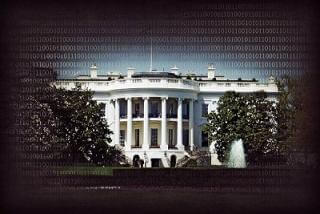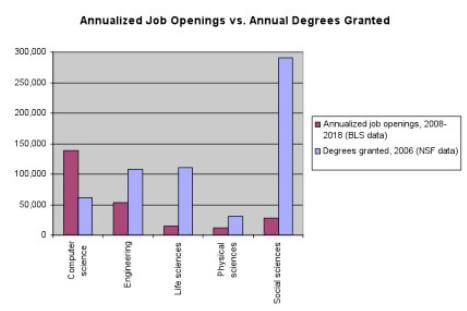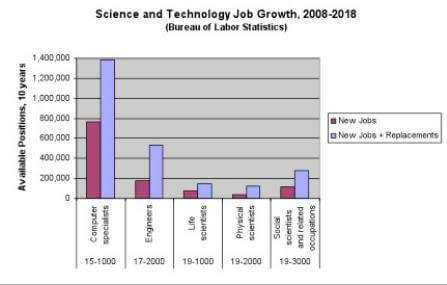White House Warns Against Supercomputer Arms Race With China

Share
2010 saw China take the number one spot in the list of the top 500 fastest supercomputers, but advisors to the White House want to make sure that spurs the right kind of response from the US. In "Designing the Digital Future...", a 100+ page report released in December, the President's Council of Advisors on Science and Technology (PCAST) made broad recommendations on how federal research money could best be directed to keep the country on the right track for growth in computing. What would the wrong response be? According to PCAST, which includes digital leaders like Eric Schmidt of Google and Craig Mundie of Microsoft, the US should not get into a supercomputer 'Arms Race' with China. Instead of looking to hit the top spot on the list of the world's best high performance computers, the US would do well to look at the underlying trends that support it: research, education, and business. President Obama has made comments urging the US to take China's growing prominence in computing as a prod to strengthen its own commitment to the industry. You can see his reference to this "Sputnik moment" in the video below. Arms race or not, it looks like the US and China are going to be competing in computing for years to come.
The video has been cued to 13:15, when Obama begins to discuss China, Sputnik, and the path for future research in science and technology. You can read an official transcript of the event on the White House site.
What's the difference between an arms race and the imagery of the space race that Obama is conjuring up here? Depends on who you ask. PCAST seems very concerned with taking too narrow of an approach. In particular, PCAST warns against using a single marker for success (ie. flops) and dedicating all research funds in that particular goal:
While it would be imprudent to allow ourselves to fall significantly behind our peers with respect to scientific performance benchmarks that have demonstrable practical significance, a single-minded focus on maintaining clear superiority in terms of FLOPS count is probably not in our national interest. Engaging in such an “arms race” could be very costly, and could divert resources away from basic research aimed at developing the fundamentally new approaches to HPC that could ultimately allow us to “leapfrog” other nations, maintaining the position of unrivaled leadership that America has historically enjoyed in high performance computing.
--- PCAST Report, Designing the Digital Future, p. 67
For years FLOPS have been the 'go to standard'. Top500 maintains a list of the fastest supercomputers around the world based on flops, and China's Tianhe-1A supercomputer took the lead by clocking an impressive 2.5 million petaflops gigaflops earlier this autumn. PCAST is essentially saying that we need to move beyond the flop metric. Graph500, used as an example by PCAST, looks at data management instead of computing operations. In that light, a computer that could handle large data flow, but do so with fewer calculations per second, would rate higher than a "faster" supercomputer. Jack Dongarra, one of the experts who maintains Top500, is also pushing for new metrics in high-performance computing (HPC). In particular he advocates evaluating computer performance in a "broad set of HPC hardware and HPC software capabilities," as seen in his HPC Challenge.
*Correction 1.17.10: Tianhe-1A was clocked around 2.5 million gigaflops, not 2.5 million petaflops. 2.5 million gigaflops = 2.5 petaflops.*
But "to flop or not to flop" is hardly the question. China created Tianhe-1A as a valuable analytical tool, but also as a statement proving that it is a major player in computing. No matter which sets of standards the scientific community ultimately adopts, it seems clear that China will pursue a device (or devices) that demonstrate their prowess in that standard as well. Guys, China's not going to stop competing just because we change the rules.
Be Part of the Future
Sign up to receive top stories about groundbreaking technologies and visionary thinkers from SingularityHub.


So what should the US do? Well, I do agree with PCAST's assertion that we should avoid an arms race. I think the 20th century taught us that Cold War-type competitions end up hurting global progress more than they foster it. What if we just look at the basics: research, education, and business?
Obama's comments come at a time when the US is already staged to pour money into federally funded computer research programs. The Networking and Information Technology Research and Development Program (NITRD) is a $4.3 billion initiative aimed at investing government funds into various institutions. PCAST's recent report on "Designing the Digital Future..." was in fact a series of recommendations for how NITRD should be structured and money spent. Private enterprises in the US (IBM, Intel, etc) are also investing in long term research. As we pointed out after China built Tianhe-1A, most of the hardware used came from the US. That probably won't be true for the next iteration of Chinese supercomputers, but the US computer industry still has a head start when it comes to HPC. With the right research, that can continue.
Yet where will we find the scientists to perform that research? The PCAST report highlights how the US is having trouble filling its demands for computer engineers. More and more of our jobs will need math and science skills, yet most of our advanced degrees are skewed away from those skills. In other words, our kids seem to prefer humanities to hard science and computing, and that could be a big problem in the years ahead. It's important to note that China has much less of a problem with getting students to succeed in these fields.
As for business, it's hard to overstate the importance of the computer industry on the economy as a whole. That's a sentiment echoed by one of the White House's chief policy makers for science and tech, Tom Kalil. During the roll out of the PCAST report, Kalil noted that two-thirds of all productivity growth in the US since 1995 has come from networking and information technology! (You can watch the roll out, including Kalil's comments starting around 8:00, in the video found here.) What you think the US government needs to do to promote the computer industry is probably influenced by your politics. Tax incentives? (De)regulation? Nothing? No matter what strategies the US employs to further the growth of the US computer industry, the industry itself is going to keep moving forward. That's what they do. As the US and China maneuver to see who can build the best future for their nations, computing companies are going to do the same for profits. Google, Apple, Microsoft, IBM, Intel, etc - these guys aren't going to stop competing any more than China will.
If the fundamentals of research, education, and business are sound, the US computing industry is likely to grow and thrive in the 21st century. Yet we need to understand that no matter what the US (or any nation) does, China's not going away, and they're not settling for second place. Why should they? They've been building their nation to compete in the world market and they are tackling every single major field they can find. As far as any scientific, or political, competition is concerned you have to look at China as a major player. One would think that would go without saying, but I'm not sure if the US, or the West in general, understands what that really means. The old paradigm of one nation leading in all fields is going to fade. Not just because of China. There are dozens of other nations (India, Turkey, Brazil, etc) clamoring to take a larger role in the global economy. So yeah, let's avoid an arms race. It's unclear if the US would ultimately win, and there's no shortage of challengers willing to take China's place even if it did.
[image credits: J.Anderson, PCAST Report]
[video credit: SBARTSTV]
[sources: PCAST Report (PDF), Computing Community Consortium]
Related Articles

Scientists Send Secure Quantum Keys Over 62 Miles of Fiber—Without Trusted Devices

This Light-Powered AI Chip Is 100x Faster Than a Top Nvidia GPU

How Scientists Are Growing Computers From Human Brain Cells—and Why They Want to Keep Doing It
What we’re reading


